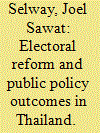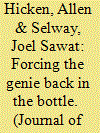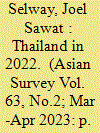|
|
|
Sort Order |
|
|
|
Items / Page
|
|
|
|
|
|
|
| Srl | Item |
| 1 |
ID:
102713


|
|
|
|
|
| Publication |
2011.
|
| Summary/Abstract |
How do changes in electoral rules affect the nature of public policy outcomes? The current evidence supporting institutional theories that answer this question stems almost entirely from quantitative cross-country studies, the data of which contain very little within-unit variation. Indeed, while there are many country-level accounts of how changes in electoral rules affect such phenomena as the number of parties or voter turnout, there are few studies of how electoral reform affects public policy outcomes. This article contributes to this latter endeavor by providing a detailed analysis of electoral reform and the public policy process in Thailand through an examination of the 1997 electoral reforms. Specifically, the author examines four aspects of policy-making: policy formulation, policy platforms, policy content, and policy outcomes. The article finds that candidates in the pre-1997 era campaigned on broad, generic platforms; parties had no independent means of technical policy expertise; the government targeted health resources to narrow geographic areas; and health was underprovided in Thai society. Conversely, candidates in the post-1997 era relied more on a strong, detailed national health policy; parties created mechanisms to formulate health policy independently; the government allocated health resources broadly to the entire nation through the introduction of a universal health care system, and health outcomes improved. The author attributes these changes in the policy process to the 1997 electoral reform, which increased both constituency breadth (the proportion of the population to which politicians were accountable) and majoritarianism.
|
|
|
|
|
|
|
|
|
|
|
|
|
|
|
|
| 2 |
ID:
111170


|
|
|
|
|
| Publication |
2012.
|
| Summary/Abstract |
In 2007, those behind the 2006 coup drafted a new constitution specifically aimed at turning back the political and policymaking clock to the pre-1997 era. However, in the preceding decade a significant transformation of Thai politics had taken place. Specifically, social cleavages had become politicized and particized in ways we have not seen before, and policy-focused, popular party programs had become part and parcel of serious party campaign strategies. Focusing on health policy, we thus argue in this article that institutional reforms have had predictable and observable implications for policymaking in Thailand, but only when considered in the context of changes to the broader social structure and other political conditions. While the 1997 reforms brought about a well-documented shift toward a more centralized, coordinated, and nationally focused policymaking environment, the 2007 reforms have been less successful at reversing that impact. In short, the coup makers are finding it harder than they supposed to force the genie back into the bottle.
|
|
|
|
|
|
|
|
|
|
|
|
|
|
|
|
| 3 |
ID:
185205


|
|
|
|
|
| Summary/Abstract |
In 2021, COVID-19 spread like wildfire throughout Thailand, with the government being routinely accused of mismanagement and facing two censures in parliament as a result. The military-aligned government also faced continuing protests against its rule. As the year progressed, the protests became more violent and spread to the peripheral regions of the country. Combined with the economic impact of the pandemic on the tourist sector, cracks are beginning to appear in the multi-party coalition. Support from the armed forces may also be waning, and there have been rumors of another coup. Nevertheless, imports and exports increased throughout 2021, and the opening of the country to 63 low-risk countries in November promises to ease the pressure on the government. The Thai parliament also approved a measure to reform the electoral system back to the one used in the 1997 constitution, under which the main opposition party, Pheu Thai, performed so well. Another election seems imminent, but it remains to be seen whether the electorate responds more to the intimidation, increasing support for the government’s largest party, the military-aligned Palang Pracharat—or to the student demands for constitutional reform, increasing support for opposition parties.
|
|
|
|
|
|
|
|
|
|
|
|
|
|
|
|
| 4 |
ID:
190037


|
|
|
|
|
| Summary/Abstract |
Thailand’s military-aligned government saw its popularity plummet in polls throughout 2022. Yet former head of the armed forces and current prime minister Prayut Chan-o-cha was resilient in the face of mass party defections, a falling-out with his fellow party leader and long-time friend Prawit Wongsuwon, a censure debate, and even a constitutional court case threatening to remove him from office. The mass street protests that were a constant feature of the previous three years evaporated as conservative forces used the controversial Section 112 Royal Defamation Law to silence the various movements’ leaders. Political attention was focused on the impending elections, which shook up the party system with rampant party mergers and switching. Meanwhile a return to the 2011 electoral rules fueled talk of another Pheu Thai landslide in the next elections. The economy began to improve with the relaxing of COVID rules and the return of tourism, throwing a lifeline to a rapidly sinking Prayut, who himself switched to a new political party before the year’s end.
|
|
|
|
|
|
|
|
|
|
|
|
|
|
|
|
|
|
|
|
|